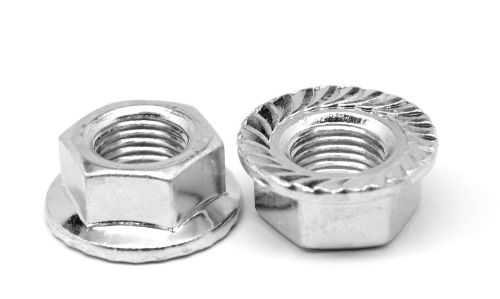

Flange nuts are essential components widely used in various industries for their unique design and functionality. In this article, we will explore the appearance and application industries of three specific flange nut variants: 3/8-24 flange nut, 10mm flange nut, and M6 flange nut. Understanding their characteristics and applications will shed light on their significance in different industries.
Appearance of Flange Nuts:
Flange nuts generally have a hexagonal shape with an integrated washer-like flange at the base. This flange extends outward from the nut's body, creating a broader surface area. The flange serves multiple purposes, including providing increased bearing surface, distributing load evenly, and preventing loosening due to vibrations. Flange nuts are available in various sizes and thread types to accommodate different requirements.
3/8-24 Flange Nut:
The 3/8-24 flange nut is a specific variant characterized by its size and thread specification. It has a 3/8-inch diameter and a 24-thread-per-inch configuration. This nut is commonly used in applications requiring a strong fastening connection, such as automotive, construction, and machinery industries. Its fine threading allows for precise adjustments and secure fastening in high-stress environments.

10mm Flange Nut:
The 10mm flange nut, as the name suggests, has a 10mm diameter. It is widely used in industries where metric measurements are prevalent, such as European automotive manufacturing, machinery assembly, and electronics. This nut provides a reliable and durable fastening solution for applications that require metric-sized fasteners.
M6 Flange Nut:
The M6 flange nut is part of the metric system and features an M6 diameter. It is extensively used in industries that adhere to metric standards, including aerospace, robotics, and precision engineering. The M6 flange nut offers excellent resistance to vibrations and is designed to withstand heavy loads, making it suitable for critical applications where secure fastening is crucial.
Application Industries:
Flange nuts find applications in various industries due to their advantageous features. Some notable sectors include:
a) Automotive Industry: Flange nuts are widely used in automotive assembly, ensuring secure connections for critical components like engines, suspension systems, and chassis parts.
b) Construction Industry: Flange nuts are employed in construction projects to fasten structural elements, such as steel beams and supports, providing stability and strength.
c) Machinery and Manufacturing: Flange nuts are essential in machinery and manufacturing processes, securing components like gears, pulleys, and shafts to maintain proper alignment and prevent unwanted movements.
d) Electronics and Electrical Engineering: Flange nuts are used in electronic equipment, providing a secure connection for mounting circuit boards, panel controls, and electrical enclosures.
e) Aerospace and Aviation: Flange nuts play a vital role in aerospace applications, ensuring safety and reliability by fastening critical components in aircraft assembly and maintenance.
Conclusion:
Flange nuts, including the 3/8-24 flange nut, 10mm flange nut, and M6 flange nut, are integral components in various industries. Their distinctive design, incorporating a flange for added stability and load distribution, makes them essential for secure fastening in applications that require reliable connections. Understanding their appearance and applications helps highlight their significance and versatility across different industries.